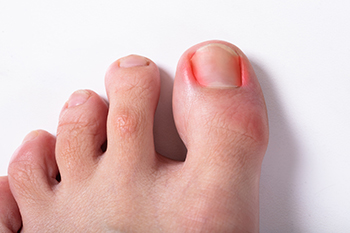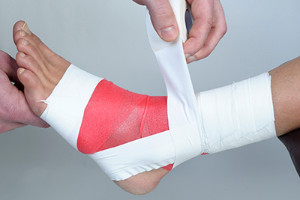Blog
Ankle Injury From Stair Falls

Falling down a flight of stairs can result in serious injuries, including broken ankles, sprains, fractures, or even head and back injuries. The ankle is particularly vulnerable due to its role in balancing and bearing weight. A broken ankle may cause severe pain, swelling, bruising, and difficulty walking. Such injuries can limit mobility and daily function. Preventing stair falls involves simple safety measures such as installing sturdy handrails, keeping stairs well-lit, and removing tripping hazards like loose rugs or clutter. Wearing supportive, slip-resistant footwear also helps reduce risks. A podiatrist can assess the damage using imaging tests like X-rays and recommend appropriate treatment. Depending on the severity, treatment may involve a cast, targeted exercises, or surgery. If you suspect an ankle injury, it is suggested that you seek immediate care from a podiatrist.
Broken ankles need immediate treatment. If you are seeking treatment, contact one of our podiatrists from Pennsylvania. Our doctors can provide the care you need to keep you pain-free and on your feet.
Broken Ankles
A broken ankle is experienced when a person fractures their tibia or fibula in the lower leg and ankle area. Both of these bones are attached at the bottom of the leg and combine to form what we know to be our ankle.
When a physician is referring to a break of the ankle, he or she is usually referring to a break in the area where the tibia and fibula are joined to create our ankle joint. Ankles are more prone to fractures because the ankle is an area that suffers a lot of pressure and stress. There are some obvious signs when a person experiences a fractured ankle, and the following symptoms may be present.
Symptoms of a Fractured Ankle
- Excessive pain when the area is touched or when any pressure is placed on the ankle
- Swelling around the area
- Bruising of the area
- Area appears to be deformed
If you suspect an ankle fracture, it is recommended to seek treatment as soon as possible. The sooner you have your podiatrist diagnose the fracture, the quicker you’ll be on the way towards recovery.
If you have any questions, please feel free to contact one of our offices located in Plymouth Meeting and Ambler, PA . We offer the newest diagnostic and treatment technologies for all your foot care needs.
Runner’s Nails

Young runners often face nail issues like inconsistent thickness or ingrown toenails due to repetitive pressure and friction from training. Running, especially over long distances, places stress on the toes as they repeatedly hit the front of the shoe. This pressure can cause nails to thicken unevenly, making them brittle or prone to splitting. Ingrown toenails, where the nail grows into the surrounding skin, often result from wearing tight or poorly fitted shoes or improper trimming techniques. These conditions can lead to pain, swelling, or infection, impacting performance and comfort. Maintaining consistent nail care, such as trimming straight across and ensuring proper shoe fit, helps prevent these problems. If you are a young runner experiencing persistent toenail pain or ingrown toenails, it is suggested that you schedule an appointment with a podiatrist for individualized treatment.
Ingrown toenails may initially present themselves as a minor discomfort, but they may progress into an infection in the skin without proper treatment. For more information about ingrown toenails, contact one of our podiatrists of Pennsylvania. Our doctors can provide the care you need to keep you pain-free and on your feet.
Ingrown Toenails
Ingrown toenails are caused when the corner or side of a toenail grows into the soft flesh surrounding it. They often result in redness, swelling, pain, and in some cases, infection. This condition typically affects the big toe and may recur if it is not treated properly.
Causes
- Improper toenail trimming
- Genetics
- Improper shoe fitting
- Injury from pedicures or nail picking
- Abnormal gait
- Poor hygiene
You are more likely to develop an ingrown toenail if you are obese, have diabetes, arthritis, or have any fungal infection in your nails. Additionally, people who have foot or toe deformities are at a higher risk of developing an ingrown toenail.
Symptoms
Some symptoms of ingrown toenails are redness, swelling, and pain. In rare cases, there may be a yellowish drainage coming from the nail.
Treatment
Ignoring an ingrown toenail can have serious complications. Infections of the nail border can progress to a deeper soft-tissue infection, which can then turn into a bone infection. You should always speak with your podiatrist if you suspect you have an ingrown toenail, especially if you have diabetes or poor circulation.
If you have any questions, please feel free to contact one of our offices located in Plymouth Meeting and Ambler, PA . We offer the newest diagnostic and treatment technologies for all your foot care needs.
Benefits and Risks of Foot Fusion Surgery

Foot fusion surgery, medially termed arthrodesis, is a procedure that permanently fuses one or more joints in the foot to improve stability and relieve pain. Foot fusion surgery is often recommended for people with arthritis, severe flat feet, bunions, and certain fractures. By eliminating movement in the affected joints, foot fusion surgery can reduce pain and improve the alignment of the foot. However, it also results in a permanent loss of motion in the fused joint. Recovery can take up to six months of wearing a cast or protective boot to ensure proper healing. Patients who undergo foot fusion surgery will also need to perform a series of exercises to regain strength and maintain mobility. While the surgery is generally effective, potential risks include slow healing, swelling, or infections. A podiatrist plays a key role in evaluating whether this procedure is appropriate, based on the patient’s condition and overall health. If you are experiencing foot pain that may need surgery, it is suggested that you schedule an appointment with a podiatrist to discuss your options.
Foot surgery is sometimes necessary to treat a foot ailment. To learn more, contact one of our podiatrists of Pennsylvania. Our doctors will assist you with all of your foot and ankle needs.
When Is Surgery Necessary?
Foot and ankle surgery is generally reserved for cases in which less invasive, conservative procedures have failed to alleviate the problem. Some of the cases in which surgery may be necessary include:
- Removing foot deformities like bunions and bone spurs
- Severe arthritis that has caused bone issues
- Cosmetic reconstruction
What Types of Surgery Are There?
The type of surgery you receive will depend on the nature of the problem you have. Some of the possible surgeries include:
- Bunionectomy for painful bunions
- Surgical fusion for realignment of bones
- Neuropathy decompression surgery to treat nerve damage
Benefits of Surgery
Although surgery is usually a last resort, it can provide more complete pain relief compared to non-surgical methods and may allow you to finally resume full activity.
Surgical techniques have also become increasingly sophisticated. Techniques like endoscopic surgery allow for smaller incisions and faster recovery times.
If you have any questions please feel free to contact one of our offices located in Plymouth Meeting and Ambler, PA . We offer the newest diagnostic and treatment technologies for all your foot and ankle needs.

